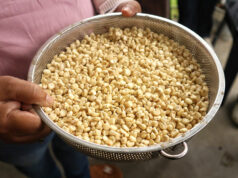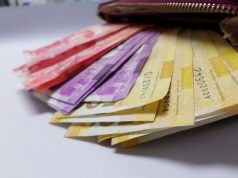No reason to panic over inflation, economic managers say
ECONOMIC managers said current inflationary conditions do not amount to a “major” crisis and added that they are confident that an Executive Order expected in the next few weeks will stabilize prices by next month.
“We are not in a major crisis. It may be a serious problem for some people, but for the nation in general it’s not a major crisis,” Finance Secretary Carlos G. Dominguez III told reporters yesterday at the Senate.
Senator Loren B. Legarda, who chairs the Senate committee on Finance, sought a briefing on inflation from economic managers on Friday amid ongoing budget hearings.
Consumer prices rose 6.4% year-on-year in August from 5.7% a month earlier and 2.6% a year earlier. Inflation averaged 4.8% in the first eight months of the year, well above the Bangko Sentral ng Pilipinas’ (BSP) 2-4% target range.
Asked whether inflation will have any impact on the proposed 2019 budget, Mr. Dominguez said: “I don’t think so.”
“We have a lot of tools that are available to us… monetary and non-monetary tools,” he added.
The economic managers recommended inflation-mitigating measures to President Rodrigo R. Duterte, who is expected to sign an Executive Order this month to implement them.
These include the immediate release of 4.6 million sacks of rice from National Food Authority (NFA) warehouses, authorizing the NFA Council to import five million sacks of rice to arrive next month and another five million early next year; streamlining the licensing procedures for NFA rice imports; facilitating the distribution of imported fish to wet markets; the formation of teams of law enforcement officers and farmer groups to monitor the transport of rice from ports to NFA warehouses to retail outlets; providing cold storage for chicken; setting up outlets where growers can offer their produce directly; and the expedited release of essential food items from ports.
The economic managers are also banking on the immediate passage of the Rice Tariffication bill that would liberalize private importation of the staple grain.
Mr. Dominguez, who sits on the central bank’s Monetary Board, also said the board, which sets rates, will not be holding any emergency meetings ahead of the scheduled gathering on Sept. 27.
“It was decided that there will be no off-cycle (meeting). You really think we are panicking? You are panicking, not us. That’s why you have to have perspective,” he said.
Budget Secretary Benjamin E. Diokno meanwhile told reporters separately that once the measures are implemented, inflation could return to the 2-4% target range as early as the fourth quarter.
He said that fish, rice, meat, and vegetables accounted for 2.4 percentage points of the 6.4% headline rate in August.
“We have drafted administrative measures which the President is studying… (Prices will) normalize. We feel that it will normalize in the fourth quarter and then we’ll be back to the 2-4% range by next year. It will be reduced by 2.4 points… most likely by the last quarter,” he said.
“We are confident that it will go back to that, especially if oil prices normalize,” added Mr. Diokno.
“People are characterizing it as runaway inflation. To me that’s irresponsible. Runaway inflation means no one is in control… where even the central monetary authorities have no handle of what’s going on.”
Mr. Dominguez added: “You have to take a long view of inflation. When you take the long view, you will realize that we are the administration with the second-lowest peak inflation rate since Cory (Aquino). You have to take a long view. Not every bump you are going to take is going to be a major crisis.”
They presented government data indicating that President Corazon C. Aquino’s government experienced peak inflation of 21.2% in August 1991, followed by 13.9% in February 1994 under the Ramos administration; 10.7% in January 1999 for the Estrada administration; 10.5% in August 2008 for the Arroyo administration; and 5.2% in October 2011 for the government of Benigno S.C. Aquino III.
Mr. Diokno added: “We have seen higher inflation in the past. It’s irresponsible to characterize what’s happening as runaway inflation. Let’s not panic.” — Elijah Joseph C. Tubayan



